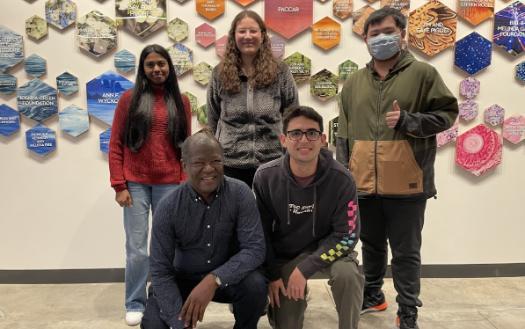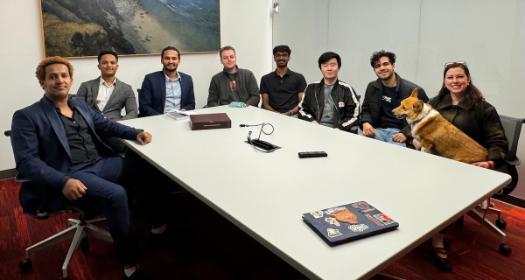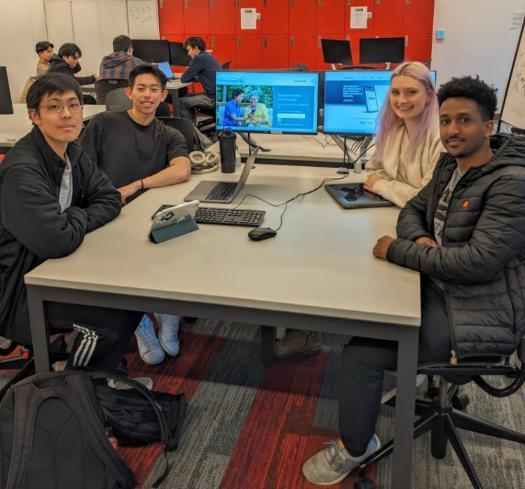Innovative Solutions, Real-World Impact
Written by Andrew Binion and Tina Potterf
Thursday, May 23, 2024
/225x0:905x434/prod01/channel_34/media/newsroom/ProjectsDay_email_header01-1130X434.jpg)
Project Center pairs students with industry leaders to gain hands-on experience tackling a pressing need or challenge.
Through Seattle University’s Project Center, students are truly engineering solutions for real-world problems.
This year student teams worked on 41 projects—38 of which will be presented at Projects Day—from sponsors including Amazon, Snohomish County, Seattle City Light, F5, Sound Transit and more. The collaboration among the students—with guidance from a faculty advisor—and organizations provides hands-on experience on projects that apply classroom learning to real-life scenarios, while shaping the next generation of STEM professionals.
“Projects Day showcases our students’ innovative solutions to real-world industry challenges through experiential learning opportunities made possible by our invaluable sponsors,” says Rachael Brown, director of the Project Center.
Now the monthslong work of these students will culminate—and be on display—at the 37th annual Projects Day, Friday, May 31, noon–6 p.m. in Sullivan Hall, with in-person and virtual opportunities to explore this year’s projects.
Here’s a look at three of this year’s projects: Our Fabric Stash, Tech4RefugeesandImmigrants and Visiting Angels.
•••
Sponsor: Our Fabric Stash, owners: Gary and Deborah Boone
Student Team: Diana Sambotin, Joseph “Bud” Robinson, Kevin Adjie, Angelina Kennedy
Faculty Advisor: James Obare
Project Scope: Create an app that allows sewists and crafters to organize their fabric, yarn and bead stashes by focusing on inventory management and design planning.
By Andrew Binion
Deep inside the historic Pike Place Market is Our Fabric Stash, Deborah Boone’s eco-friendly consignment shop devoted to fabric—sometimes vintage and often rare—for use by sewists and artists. But sometimes devotion to fabric can get out of control, with people collecting more than they can use and losing track of what they have.
That’s why Boone has partnered with computer science students through the Seattle University Project Center, tasking them with creating a free app for customers and non-customers alike to take control of their stash.
The project Boone assigned to students was to endow the app with two functions. First, it would allow tailors and artists to systemically inventory their “stash” of fabric.
“I kind of went back to the basis of the business when I first started,” Boone says. “I just wanted people to get organized and to be intentional about projects and buying.”
The app’s second function gives users a “design board,” or a way to visually represent their projects. Boone intends for the app to be available for anybody who wants to get their fabric stash organized and comes without any obligation to buy from the store.
The app aligns with the three philosophical pillars of Our Fabric Stash—keep usable material out of the waste stream, maintain skills from one generation to the next and bring awareness to social causes.
For two members of the student team, the project required them to learn new software and databases, tailoring the needs of the project to the technology, rather than the other way around.
Diana Sambotin, ‘24, a computer science major with a minor in business administration, says there was a learning curve, with the team at first not accomplishing as much as it intended.
“But we had this sprint where we made a lot of progress,” she says. “And when we went to show it to our sponsor, she was super blown away and impressed. And it was just exciting to see her be excited about it. So, it’s just the little wins are always nice.”

The Our Fabric Stash team and advisor.
“The big overarching thing is in the future, I'll definitely be faster and I think the team will be faster at figuring out what we need specifically for the project,” says Joseph “Bud” Robinson, ‘24, also majoring in computer science with a minor in business administration.
After working in high-tech for more than 20 years, Boone sees partnering with the Project Center and working with students as keeping up with changes in the industry. This is her third year partnering with the College of Science and Engineering’s Project Center.
“It was cool because I felt like I had my team again,” she says, with a laugh. “Having the relationship just keeps me in tune with what's going on. I’m out of corporate now, but this is the new wave of what’s coming up as far as the generations are concerned.”
With such a challenging project, Assistant Teaching Professor of Computer Science James Obare says his role as faculty advisor is in assisting students by creating an environment where students could do their best, along with meetings with team members and the sponsor. “For a student the feeling of successful development of software is rewarding,” he says. “Our hope is that they join software development houses as entry level software engineers or better still start up their own company.”
•••
Sponsor: Tech4RefugeesandImmigrants (founder, Afrikaan Sahra)
Student Team: Tarun Mathew, William McCormick, Parsa Rahimi Derimi, Kenneth Young Faculty Advisor: Kivanc Dincer, PhD
Project Scope: When immigrants/refugees come to the U.S., they often face challenges to accessing social services in big and tech cities like Seattle. This project aims to develop an intuitive application/website for immigrants and refugees, addressing challenges in accessing social services, while also creating a database integrated with a user-friendly interface to overcome language barriers and tech limitations.
By Tina Potterf
For this year’s senior capstone project, soon-to-be graduate Tarun Mathew worked on project that leverages technology to empower immigrants and refugees, equipping marginalized communities with a tool to easily access social services.
The project, part of this year’s slate from the Project Center, is sponsored by Tech4RefugeesandImmigrants (T4RI) and Mathew, ’24, and his team worked on a pressing real-world problem for the nonprofit and its founder Afrikaan Sahra.
This is the first year that Tech4Refugees has partnered with the Project Center. Specifically, the project’s scope focused on enhancing a multilingual support application’s usability and accessibility for refugees and immigrants. “The student team was tasked with ensuring social services are easily navigable and beneficial for our target audience, regardless of how tech savvy they are,” Sahra explains.
On the team Mathew played a dual role, focusing on project management and developing the front-end user interface for the website. “I was responsible for overseeing the project’s progress and ensuring the website’s interface is user-friendly and accessible,” says Mathew, a computer science major with a specialization in business administration.
Approaching the project involved a thorough understanding of the problem and its potential challenges.
“We prepared extensive questions to grasp the project's scope and identified potential gaps to address,” Mathew explains. “Our decisions were driven by the impact on end-users, ensuring that delivering value to customers remained our top priority.”
Tackling this project and arriving at a workable solution also involved exploring a variety of existing technologies, adds team member William McCormick, ’24, a computer science and math major. According to McCormick, much of the time “was spent researching and experimenting with different technologies that could address the challenge presented by our sponsor.”

The Tech4RefugeesandImmigrants team with founder, Afrikaan Sahra.
The freedom to innovate and devise solutions independently was particularly enriching, says Mathew. “My favorite part of this experience has been the autonomy we’ve had to solve the problem in the way we believe is most effective.”
For Mathew, the highlight of this experience has been the camaraderie and learning within the team.
“Getting to work with and learn from my team members has been incredibly rewarding. We all share a passion for using our skills to make a positive impact and this project is an excellent opportunity for us to learn the fundamentals of product development,” he says. “We established an atmosphere of accountability, respect and compassion that encouraged risk-taking and personal growth.”
Working with students has been an enlightening experience for the project sponsor, too.
“The most rewarding aspect has been seeing their ideas directly benefit the communities we serve,” says Sahra. “Their growth, from understanding our mission’s complexities to implementing practical solutions, has been exceptionally gratifying.”
Looking ahead, Mathew envisions meaningful change arising from their work. “I hope our project sparks a shift in how technology can be leveraged to assist those in need. This is just the beginning of integrating social services with technology to make a tangible difference,” he says.
Teammate McCormick agrees: “I believe we’ve laid the groundwork for Afrikaan’s nonprofit and I hope that our efforts will ultimately benefit the immigrant population of Seattle.”
•••
Sponsor: Visiting Angels of Greater King County
Student Team: Alina Podd, Samuel Nerayo, Victor Kesuma, William Sun
Faculty Advisor: Sheila Oh
Project Scope: Implementation of scheduling tool on desktop computers and developing a way to track and display caregiver availability.
By Andrew Binion
For Visiting Angels, which provides homecare services to senior citizens in their homes and senior living communities across King County, helping people live independent and dignified lives comes naturally.
But what isn’t so intuitive is the massive administrative task of ensuring its caregivers’ schedules, skillsets and geographic locations can be matched up with the needs of clients, ensuring that clients are properly cared for and that caregivers, who often work more than one job, aren’t stretched thin.
“Their availability is very fluid and changes so quickly and we need a quick, easy way to capture that change,” says Tina Valdez, executive director and owner of Visiting Angels of Greater King County. “Time is of the essence when trying to assign a caregiver to a client’s schedule.”
Having a tool that allows managers to effectively schedule visits within their region is essential to balancing the needs of clients and caregivers and that was the task Visiting Angels handed students working on their senior capstone project.

The Visiting Angels team at work.
It was the second year SU students had tackled the challenge of creating a program that could serve as the scheduling brain for the organization, a project that another team began last year.
Visiting Angels uses a service to coordinate scheduling, “but the scheduler has to spend a lot of time keeping a lot of information in their head and communicating a lot between caregivers to figure out all the scheduling,” says team member and computer science major William Sun, ‘24.
The project ultimately took two forms—creating an interface for employees to enter their availability, making the job of scheduling much more fluid and ensuring that the work last year’s team accomplished could be implemented.
This required students to utilize all the computer science knowledge they learned in the classroom combined with the soft skills needed to be a successful software engineer, says faculty advisor Sheila Oh, teaching professor and director of the Computer Science Fundamentals Certificate Program.
“By working with real companies, students can address the exact needs of a business, learn domain knowledge and work with key stakeholders,” says Oh. “Students are asked to adapt and be agile in their thinking, planning and development of software solutions since projects can often change due to updated or new technology solutions or business needs.”
Though it proved a challenge for students, who pushed themselves to learn new tools and coordinate the division of work within the team, the biggest reward was having something concrete they could show their client, moving the project out of the theoretical into reality.
“The most fun part has been seeing our sponsors be able to actually use this and be excited about it,” says computer science major Alina Podd, ‘24. “When we were able to figure out some of those connection issues, they were really excited and wanted to use it, which was cool.”
This is Part I of a two-part series spotlighting some of the projects at the year’s Projects Day.
Written by Andrew Binion and Tina Potterf
Thursday, May 23, 2024
/90x0:1111x645/prod01/channel_34/media/seattle-university/news-amp-stories/images/Skubal-signing-jersey.jpg)
/79x0:1051x614/prod01/channel_34/media/seattle-university/news-amp-stories/images/Seattle-U-Gives-final-use-1130X614.jpg)
/125x0:1075x600/prod01/channel_34/media/seattle-university/news-amp-stories/images/Mexico-immersion-man-painting-mural.jpg)